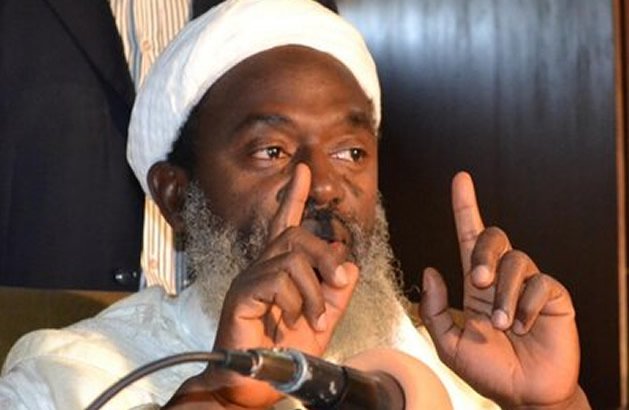Gumi, while featuring on Morning Show, a programme on Arise TV, on Wednesday, alleged that a lot of those he described as bad elements in the nation’s security forces were colluding with bandits.
The cleric stated that the bandits had been able to access assorted weapons that they used against Nigeria due to the cooperation of the security agents.
Gumi said these as The PUNCH learnt that at least 200 residents of Zamfara State had been killed in violent attacks despite an order by the President, MajorGeneral Muhammadu Buhari (retd.), declaring a ‘no-fly-zone’ over the state’s airspace.
On his part, the Kaduna-based cleric alleged that the security agents were doing business with the security and lives of Nigerians
Gumi said, “These bandits, if you don’t know, are cooperating with a lot of bad elements in our security system. This is a business. So many people are involved; you will be surprised.
“They were caught in Zamfara. They were caught everywhere. How do these big weapons cross our borders?
“How can these big weapons cross our borders and get into the forest without the cooperation of some bad elements of the security operatives assisting them? It is not possible.
“If I give you the same quantity of guns, can you take them to the UK? You can’t, because the security is at alert. Part of fighting this banditry is to overhaul our security system.”
He attributed the incessant banditry and herdsmen attacks across the country to tribal wars.
“What you call banditry, when you cross to the other side, you find out Nigeria is fighting a tribal war,” he said.
Gumi, who admitted that bandits commit atrocities, also accused the government at all levels of taking sides in the raging attacks on Nigerian communities.
“When you said these bandits are committing atrocities, yes, agree they are committing crimes. They are killing people. They are raping. They are doing all sorts of atrocities.
“But, have you for once gone to their own sides and see all sorts of atrocities that are also committed against them?” he asked.
Gumi claimed that herdsmen had been lynched across the southern region, while specifically naming Anambra and Oyo states.
The prominent cleric believes that the government should be neutral, rather than taking sides in addressing banditry and herdsmen attacks.
He stated, “The moment government takes sides, it becomes part of the conflict. And this is what I saw in Zamfara State, in Niger State and other states.
“It is very unfortunate that in the 21st century because of the fracture in our governmental structure people have turned to tribalism or religion originality to express their grievances,” he lamented.
He described the amnesty granted to bandits by the Katsina State Governor Bello Masari as “a political amnesty without any package.”
Gumi said “You granted a political amnesty, I mean an amnesty in the front of the media but in the real sense there was no amnesty.
“Amnesty comes with a package,” he maintained, stating that “the package is that you rehabilitate these criminals, you provide them social amenities.”
Allegation, attempt to undermine troops, denigrate military – Army
But the Army denied the allegation made by Gumi.
The Director of Army Public Relations, Onyema Nwachukwu, in a statement on Wednesday described the claim by the cleric as a calculated attempt to undermine the sacrifices of the troops aimed at restoring peace in the country.
The statement was titled ‘Nigerian Army not colluding with bandits.’
It read, “The Nigerian Army has just been alerted to a submission by Sheikh Ahmad Abubakar Gumi when he featured on ARISE TV Morning Show on Wednesday, June23, 2021 alleging that the Nigerian military is colluding with marauding bandits who have been responsible for various crimes and atrocities against Nigerians and the Nigerian state.
“The Nigerian Army wishes to state that contrary to Sheik Gumi’s claims, the Nigerian Army remains a bona fide symbol of national unity that has conducted its constitutional responsibilities in the most professional manner in line with global best practices of adherence to the rules of engagement and protection of the fundamental human rights of the citizenry.
“The sweeping allegation peddled by the scholar is not only sad and unfortunate, but a calculated attempt to denigrate the Nigerian military and undermine the sacrifices of our patriotic troops, who are working tirelessly to restore peace and stability across the country.”
Onyema stated that the military accused of connivance recently put their lives on the line to rescue abductees of the Government Secondary School, Birnin Yawuri from bandits.
He added, “While the NA will not attempt to excuse the possibility of black sheep amongst its fold, it must be stated unambiguously that it will not condone any form of sabotage or aiding and assisting the enemy by any personnel, as provisions for dealing decisively with such acts are crystallised in Section 45 (1) of the Armed Forces Act CAP A 20 Laws of the Federation of Nigeria 2004.
“It must also be pointed out that while the military is very much receptive to constructive criticism, it should not be perceived as a gateway for derogatory comments that have the potential to embolden criminals. It is also necessary to reiterate that patriotism must be taken to a trajectory where subversive conversations on the state are brought to the barest minimum.
“Opinion leaders are enjoined to demonstrate patriotism in building the peace, rather than being agents of destabilisation, thereby aggravating the current security challenges facing the nation.
“The Nigerian Army wishes to reassure law abiding citizens, that troops will continue to conduct themselves professionally in consonance with the code of conduct guiding our operations in all combat engagements, in line with the provisions of the Nigerian Constitution and global best practice.”
Over 200 killed in Zamfara despite Buhari’s no-fly-order
A tally by The PUNCH shows that 200 residents of Zamfara State have been killed in violent attacks despite a ‘no-fly-zone’ declared over the state’s airspace.
The National Security Adviser, BabaganaMonguno, had on March 2, 2021, conveyed the President’s no-fly-order which was done in a bid to end banditry in the gold-rich state.
Seeking to put an end to banditry that has ravaged Zamfara State and other parts of the North-West and North-Central states, Buhari declared the state a no-fly-zone and placed a ban on all mining activities.
A no-fly zone is a territory established by a military power over which certain aircraft are not permitted to fly.
Presidency officials had told The PUNCH that Buhari was shocked that some of the foreign illegal miners were linked to acts of banditry and the Zamfara State government simply ignored the destruction of some villages where the mining takes place and tolerated the use of choppers in and out to facilitate illegal mining.
The traditional rulers in the state told service chiefs, who visited the state, that there were over 30,000 bandits in Zamfara forests, a number that far outweighs the less than 10,000 troops deployed in the state to tackle insecurity.
A tally by The PUNCH, however, showed that at least 200 people had been killed by bandits since the no-fly-zone came into effect in March even as states sharing boundaries with Zamfara such as Kaduna,Niger and Kebbi had continued to witness killings and abductions.
On March 3, a day after the no-fly-order came into effect, about 50 persons were abducted while several houses were burnt in an attack on Tungar Baushe community in Mutunji district, Maru Local Government Area of the state but no deaths were reported.
Some of the bandits were also reported to have been killed by the military. The Nigerian Army said on May 10 that its troops killed 48 bandits operating across different camps in the Maru local government area of the state.
On April 21, however, about 90 persons were killed during separate attacks in Gusau, Maradun and Bakura local government areas. Many of the victims were said to be vigilantes. While 62 corpses were immediately recovered, residents stated that the death toll rose to 90 the following day.
Over 100 bandits were reported to have stormed Dansadau Town on May 18, stealing over 300 cows and looting shops but no deaths were reported.
However, on May 22, bandits killed 21 people including two policemen in Gabaken, Rigiya, Donroyi, Torawa, and Riwoji all located in the Zurmi and Kaura Namoda local government areas of the state.
On May 24, gunmen on motorcycles invaded Dandamji, Gidan Runji, Doka, Yanmadanga and Yarkatsina villages killing at least 10 people. The police, however, claimed to have killed 10 of the bandits as well.
Bandits killed about 12 farmers and injured nine others in attacks in the Gusau Local Government Area on June 3.
On June 12, about 54 villagers were killed in an attack on five communities in Zurmi village. The residents were reported to have taken some of the corpses to the palace of the village traditional ruler to protest.
FG should assess impact of no-fly-zone – Zamfara
When contacted, the Special Adviser to Governor Bello Matawalle on Public Enlightenment Media and Communication, Alhaji Zailani Bappa, said the question on whether the no-fly-zone order had reduced killings and kidnapping in Zamfara State should be directed to the Federal Government.
Bappa said the Federal Government has enforced the no fly zone order aimed at restoring peace in the state as such it should be asked whether the order has made an impact.
“You should direct your question to the Federal Government no know whether the no fly zone order has stopped the killings and kidnapping of people in the state”.
“Zamfara State Government is not supposed to say whether the order has made an impact or not because it was not responsible for that”.
“As a journalist, you can make your own assessment through investigation to find out whether the order has stopped the killings and kidnapping of people in the state,” said Bappa.
Speaking with The PUNCH on Wednesday, the Country Director of Amnesty International, Ms. Osai Ojigho, said it was very sad that Zamfara and other states were still seeing high numbers of people who had been killed, lost their homes and displaced as a result of the violence.
Ojigho added, “One of the things we are getting from the ground is that many of these areas are dominated by a strong military presence but there is a slow response in terms of engaging the bandits, criminals whatever you want to call them in these communities and it is due to years of failing to find long lasting solutions to this crisis.”
In his reaction, however, the Director, Army Information, Brig. Gen.Onyema Nwachukwu, said the army had averted many attacks in Zamfara State and had bombarded the hideouts of bandits.
He, however, urged residents to assist the military with credible information on security.
Nwachukwu said, “As we speak, troops of the Nigerian Army under the aegies of Operation Hadarin Daji in the North West are conducting aggressive clearance operations on suspected bandits’ enclaves.
Culled from the Punch News Nigeria


























